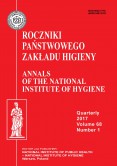Rocz Panstw Zakl Hig 2015, 66(2): 173-178
Antimicrobial effects of citrus sinensis peel extracts against periodontopathic bacteria: an in vitro study.
[Antimicrobial effects of citrus sinensis peel extracts against periodontopathic bacteria: an in vitro study.]
ABSTRACT
Background. Use of plant extracts and phytochemicals with known antimicrobial properties may have great significance in therapeutic treatments.
Objective. To assess the in vitro antimicrobial potential and also determine the minimum inhibitory concentration (MIC) of Citrus sinensis peel extracts with a view of searching a novel extract as a remedy for periodontal pathogens.
Materials and Methods. Aqueous and ethanol (cold and hot) extracts prepared from peel of Citrus sinensis were screened for in vitro antimicrobial activity against Aggregatibacter actinomycetemcomitans, Porphyromonas gingivalis and Prevotella intermedia, using agar well diffusion method. The lowest concentration of every extract considered as the minimal inhibitory concentration (MIC) values were determined for both test organisms. Confidence level and level of significance were set at 95% and 5% respectively.
Results. Prevotella intermedia and Porphyromonas gingivalis were resistant to aqueous extracts while Aggregatibacter actinomycetemcomitans was inhibited at very high cncentrations. Hot ethanolic extracts showed significantly higher zone of inhibition than cold ethanolic extract. Minimum inhibitory concentration of hot and cold ethanolic extracts of Citrus sinensis peel ranged between 12-15 mg/ml against all three periodontal pathogens.
Conclusions. Both extracts were found sensitive and contain compounds with therapeutic potential. Nevertheless, clinical trials on the effect of these plants are essential before advocating large-scale therapy.
Downloads: 3822


